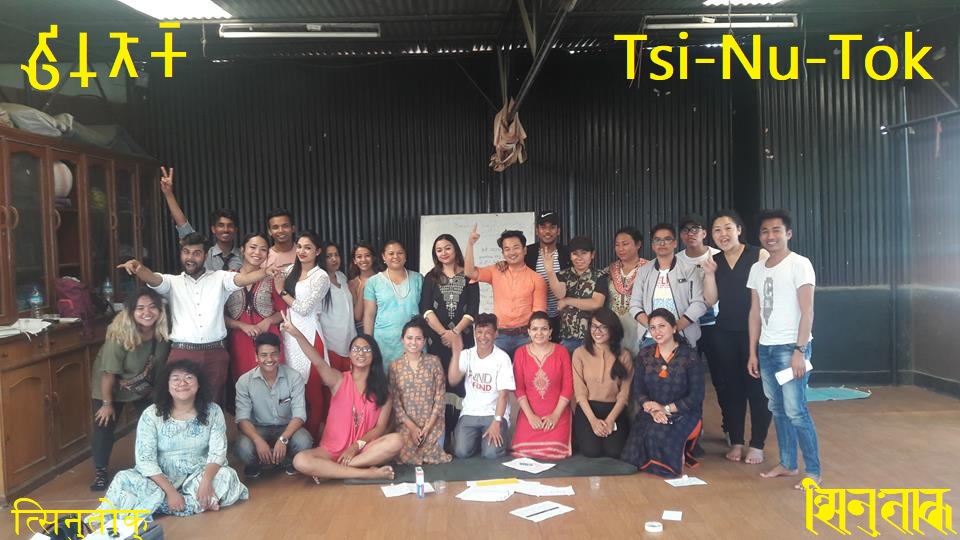
Kathmandu (Pahichan) June 6 – The fellows of Women Leadership Summit as a part of stakeholder meeting of Blue Diamond Society, organized “Breaking the normality” in BDS Care and Support Building where about 30 people came for an open discussion on issues of gender, sexuality, body image, body shaming, patriarchy and feminism.
Rukshana Kapali from Blue Diamond Society is a part of Women Leadership Summit 2018, which is a six month intensive leadership course organized by Ujyalo Foundation.
She along with other fellows from WLS 2018, came together to create this platform. Rukshana Kapali gave the idea that a platform should be created to young LGBTI for discussing on LGBTI issues, which will create new discourses in the movement.
The idea was implemented with approach along Blue Diamond Society. The program today was named “Breaking the normality” which had three sessions: 1) Unboxing gender and sexuality, 2) Feminism and Patriarchy, 3) Body Image and Body Shaming. The sessions were interactive and intense with discussions.
The program kicked off with participants writing their name, gender identity, sexual orientation and preferred pronouns on a paper and sharing how they realized about this and if they have explored it or not. Lesbians, gays, bisexual men, bisexual women, transgender men and transgender women with heterosexual women explained how they came to know about their own sexuality.
The discussion then proceeded how transgender people also face heteronormality and people think transgender people are by default heterosexual. A transgender woman shared her own story about being bisexual. Similarly, everyone had their own stories to say.
The topics of fluid sexuality and broader understanding of sexuality took an intense talk. Sex is an integral part of sexuality, but sexuality is not ‘just’ sex. A broader way of looking at sexuality is somehow missing. The way I present myself, the way I express myself, the way I dress is also part of individual’s sexuality.
“We LGBTI people, who unboxed the stereotypes of socially connoted rigid sexuality, are now creating boxes for ourselves. Even when I say that I am a lesbian, people box me into certain stereotypical categories which is problematic”, says Durga Thapa, a participant, “All lesbians cannot act the same way, dress the same way or eat the same way. People need to understand that there is diversity.”
There were discussions about myths of feminism, what is patriarchy and unpacking the issues. Participants shared how patriarchy is hurting men too and its impact on LGBTI. Some even shared that it is dangerous how current trend amongst LGBTI people is inheriting patriarchy.
Transgender women also shared how they felt loss of power associated with their organs and shift of social behavior on them after coming out. Rukshana Kapali pointed how we LGBTI people are also creating our own new set of gender roles.
“I was always commented that I don’t look as a transwoman, because I don’t like makeups and I don’t have stereotypical transwoman behavior. What the hell should a transwoman even look like” she commented. Personal anecdotes and experiences came out.
A session activity led to another topic of Body Image and Body Shaming. “I was always hated by others because I used to be fat”, Bishwaraj Adhikari from Blue Diamond Society said. The session was intensive in terms of people shared how they are judged by their appearances and it is problematic ideals of society.
The topic of body ideals and media picturization of beautiful bodies is problematic connotations which make a very rigid and narrow definition of beautiful bodies. “I make quite radical stand when people make comments on my body. I reject it.”, Rukshana added, “Apart from this I also think it is capitalism. All the makeup industries, beauty product industries earn billion dollars by making people feel shameful and unwanted for their bodies. That is why media shows very unrealistic kind of bodies as beautiful.” Most of these bodies do not even exist in real, they are photoshopped. People added that transgender people feel uncomfortable in their body due to gender dyphoria, but it is not the case everytime. “I feel that I want to appear feminine, so I take hormones. That is my own free informed choice I made. But I am made to feel that if I turn very chubby, I am too ugly or if my skin is getting darker, I am ugly. These are not gender dysphoria, these are notions of beautiful body which are problematic”, Rukshana added. She also talked that people think a transgender person is by default very eager to go through all process of sex change, which is not a fact. There are degrees and levels of gender dysphoria and not all transgender people want to change their sexual organs. There is diversity in it as well.
The program ended with intensive discussions that went around these topics which have essentially been discussed in activist platforms and now amongst LGBTI groups. Manasbi Paudel, Samanata Thapa, Durga Sapkota, Nilu Thapa and Nisha Paudel were other WLS 2018 fellows who organized this platform and kicked off the first program with Blue Diamond Society. The name of the platform Tsi-Nu-Tok is in Myahq(Kusunda) language of Nepal which died with its last speaker. Its meaning is I-You-We”, as applied meaning, “I” and “You” can come together so “I” and “You” can be “We”, and we can create strong sense of awe feeling by which we go together as “we”.
“I chose this name so that we also respect a lost cultural heritage of Nepal and embrace diversity. We really want to continue discussions like these. From next sessions we will also have a keyword name of session which will be in various languages of Nepal turn by turn. This is my way of embracing diversity of our country”, said Rukshana.
Copyright © All right reserved to pahichan.com Site By: Sobij.